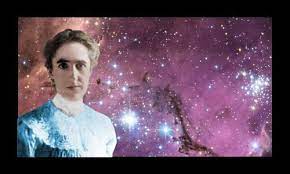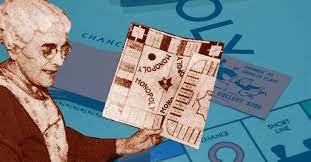Some may wonder exactly why women should have a month. Made official in 1987, Women’s History Month was launched to shine a light on all the contributions women have made over the last 1900 years. If we want to truly look at history- we need to celebrate this. Women have been trailblazers for a long time. Yet, in most History books, Literature books, and especially in Math & Science books, women are scarce. Is it because women have not made many contributions to society? NOPE. It’s because in many cases, they were not recognized for their accomplishments simply because they were women. So, brush up on your women’s history for your next cocktail zoom and bust out your knowledge on these five little known women. It is your time to shine, ladies.
- Nettie Maria Stevens, 1861
I think it is only appropriate to start with Nettie Maria Stevens, geneticist. She began her career studying beetles, and would eventually discover that the male beetle’s semen had two different sizes. The semen sizes would dictate whether a male or female would be born. Yes, she developed the X-Y Chromosome system. X being the larger chromosome and Y being the smaller. (XX) chromosomes would be a female. (XY) would be a male. Because she was a woman, the geneticist who discovered this around the same time, Edmund Beecher Wilson received all the credit.

2. Henrietta Swan Leavitt
Henrietta Swan Leavitt was an astronomer and worked at the Harvard College Observatory in the late 1800’s. She was used as a human ‘computer’ to analyze data (As someone who needs a calculator for any Math, this fact alone amazes me). Henrietta Swan Leavitt was in charge of the tedious job of cataloging and monitoring the brightness of stars. While she was doing this task, she realized that the stars were not changing brightness but actually moving farther away. Henrietta Swan Leavitt created the first 3D map of the galaxy. She discovered that you can figure out how far away a star is by its brightness which is known as Leavitt’s Law and is still used today.

3. Elizabeth Magie
Elizabeth Magie created the concept that would eventually become the tried and true game we all know as ‘Monopoly.’ She created the game with the title ‘The Landlord’s Game’ around 1900. It is said that the game was made to shine a light on the corrupt and devastation monopolies can inflict upon society. Ironically, it was an unemployed victim of the great depression, named Charles Darrow that would take this game to the masses. Darrow found himself playing ‘The Landlord’s Game’ with some Quaker friends in Atlantic City. He took a variation of this game and its idea and pitched it to Parker Brother’s and subsequently became the first board game millionaire. Magie did have a patent for her ‘Landlord’s Game’ however, only received $500 for it. This makes me feel like Charles Darrow should “Go directly to jail, Do not pass go. Do not collect $200.”
Trotula de Salerno was alive between the 11th-12th century. She is said to be one of the first medical practitioner focusing on women’s health; the world’s first gynecologist. Trotula of Salerno recommended women eat healthy food, reduce stress, and exercise to remain healthy (wait…this sounds familiar). According to the Brooklyn Museum, Trotula became highly skilled at diagnosing women, was an advocate of women’s health, and revolutionized the field with the concept that men could be infertile. In the 12th century, her writings became a 63 chapter book named Passionibus Mulierum Curandorum (The Diseases of Women). This book encompassed all things women, from menstruation to disease to childbirth, and became the absolute reference book of pre modern medicine. Ever hear of her? Me either. I won’t lie, she sounds amazing.
5. Ada Lovelace
Ada Lovelace was a Mathematician born in 1815 and is known as the world’s first computer programmer. Although she is not as obscure as the other women mentioned in this article, Ada Lovelace is worth mentioning as she created the first algorithm. Computerhistory.org reports, “In 1843 she published a translation from the French of an article on the Analytical Engine by an Italian engineer, Luigi Menabrea, to which Ada added extensive notes of her own.” Ada was somewhat of a visionary seeing the potential in the ‘analytical engine’ working beyond calculating only mathematics.
As mentioned before, women have and continue to be trailblazers in so many way. We must never give up on our dreams. Remember: You are amazing and have so much to contribute to the world and your children are watching you. Your daughters and sons are learning about themselves through you. They hear you even when you don’t think they are listening. They are observing your interactions, your choices, your dreams.
Parents teach your children about the amazing things women have accomplished in this world. I would like to add to the quote above. That may we not only raise strong women, but also may we raise strong men who are not intimidated by a strong women but in awe and support of them. Help your children to identify both their talents and what they love. Encourage them to pursue their dreams.
We can relate Women’s History Month to our own children in so many ways! Here are a few ways to connect this month to your child’s life.
Some children’s books that you can introduce:
Watch a video here about the creators of the set of books referred to as Goodnight Stories for Rebel Girls 2 as well as a read aloud section from the book:
https://www.kickstarter.com/projects/timbuktu/good-night-stories-for-rebel-girls-100-tales-to-dr
We encourage every parent to consider empowering books, whether you have sons or daughters, because there are great lessons found within failures, perseverance, commitment, and dedication. I love all the stories found within these books.
Why is the story of Ruby Nell Bridges one of Nurture Notetaker, Kim Bandi’s personal favorites from this set of books? Because this brave activist made an impact in first grade as she endured unjust struggles with strength and bravery. Her story is a great reminder of the significance of childhood and the choices we make together with the young women we are raising.
Below are two samples of what you may find in a read aloud online.
J.K. Rowling is another favorite of Nurture Notetaker, Kim Bandi because loves hearing her quote “It is impossible to live without failing at something, unless you live so cautiously that you might as well not have lived at all.”

Published by Penguin Random House, it is described as “She (Rachel Carson) was a major figure in the early environmental movement, and her work brought a greater understanding of the impact humans have on our planet. Rachel Carson and Her Book That Changed the World offers a glimpse at the early life that shaped her interest in nature, and the way one person’s determination can inspire others to fight for real change.”
Grab a piece of paper and crayon (take the wrapper off) and make a tree rubbing for a fun activity to accompany this book! This easy activity is a great way to expand language skills by describing the texture of the tree, the colors you see, and all the animals that benefit from the tree. You can even ‘adopt’ the tree and observe it all year long throughout each season.
Virtual Field Trip
Another fun activity to do with your children is to take a virtual field trip! Nurture Notetaker, Jaime Sinift-Heimer loves virtual field trips as a way to explore the world and create experiences from the comfort of your own home. Check out https://www.womenshistory.org/womens-history/online-exhibits for numerous online exhibits to peruse. A great learning opportunity and also a great way to expand language. Virtual field trips are convenient, easy, and free!
Women’s History Month is really about the conversation. Talking about and celebrating all the many accomplishments women have made.

sold on etsy.com
References: Archive.com, thebestschools.org, scientificwomen.net, mentalfloss.com, theatlantic.com
Love,
Your Nurture Notetakers
Jaime Sinift-Heimer, M.S. CCC-SLP/L
Kim Bandi, OTR/L


